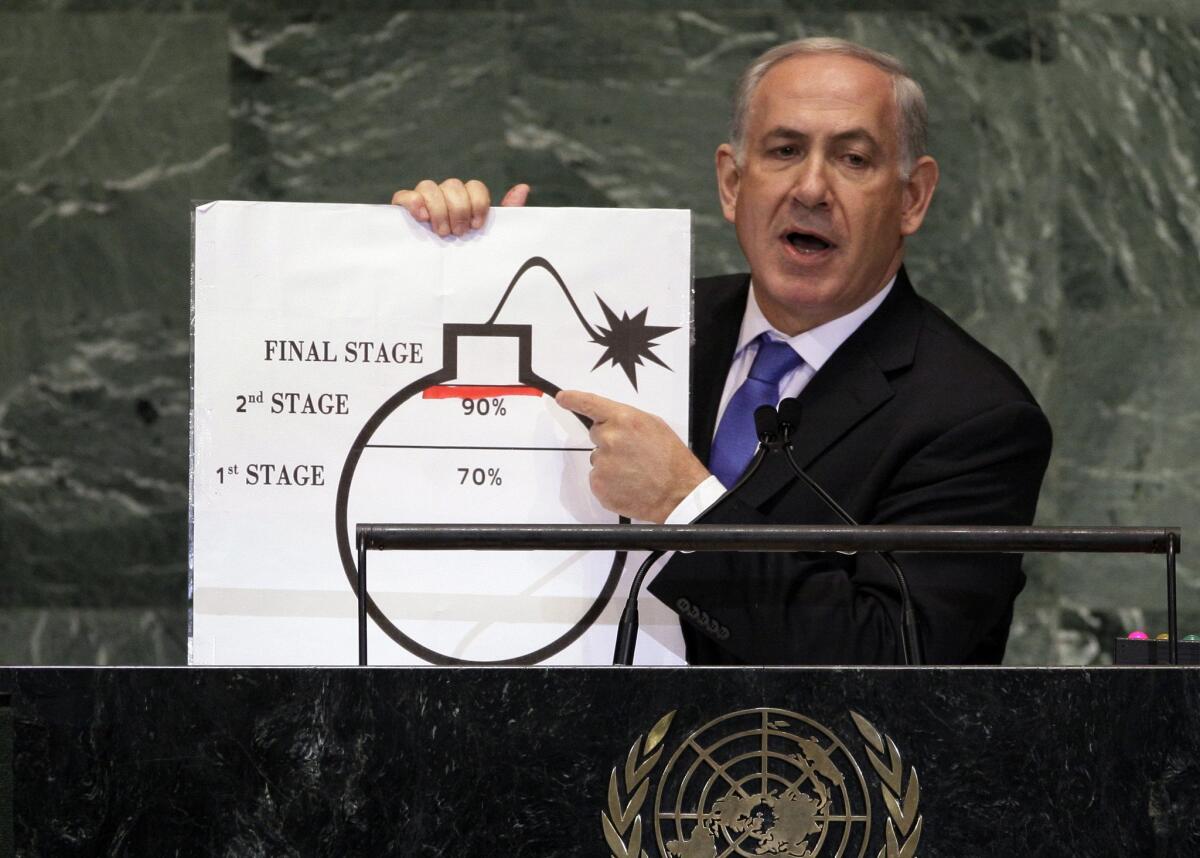U.S., Israel trade jabs over Netanyahu’s ‘destructive’ speech

Tension between Israel and the U.S. escalated sharply Wednesday as senior Obama administration officials publicly admonished Prime Minister Benjamin Netanyahu for accepting an invitation to address Congress two weeks before Israeli elections and questioned his judgment on nuclear talks with Iran.
National security advisor Susan Rice said in a television interview Tuesday that the Israeli prime minister’s actions were “destructive” to the close ties between the two countries.
Netanyahu fired back Wednesday, accusing the United States and its negotiating partners of abandoning the commitment to prevent Iran from obtaining nuclear weapons.
Relations between Israel and the United States have plummeted since Netanyahu accepted the invitation by House Speaker John A. Boehner (R-Ohio) to deliver a speech Tuesday on the perils he sees in striking a deal with Iran over its nuclear program, one of President Obama’s top foreign policy priorities.
Boehner did not consult the White House or State Department before issuing the invitation, a move that administration officials have called a breach of protocol.
In an interview on the PBS program “Charlie Rose,” Rice said Netanyahu’s decision to go ahead with the address had “injected a degree of partisanship which is not only unfortunate, I think it’s destructive of the fabric of the relationship” between the two countries.
“The relationship between Israel as a country and the United States as a country has always been bipartisan,” Rice said. “We need to keep it that way.”
Obama has said that he won’t meet with Netanyahu so close to the March 17 elections in case it is seen as trying to influence the outcome. Vice President Joe Biden and Secretary of State John F. Kerry plan to be out of town, and several Democratic lawmakers have said they will skip the speech in protest.
The Israeli prime minister on Tuesday turned down an invitation to meet privately with Senate Democrats, saying it “could compound the misconception of partisanship regarding my upcoming visit.”
“I regret that the invitation to address the special joint session of Congress has been perceived by some to be political or partisan,” Netanyahu said in a letter to Sens. Richard J. Durbin (D-Ill.) and Dianne Feinstein (D-Calif.). “I can assure you that my sole intention in accepting it was to voice Israel’s grave concerns about a potential nuclear agreement with Iran that could threaten the survival of my country.”
Netanyahu’s defenders say the approaching deadline for an accord with Iran justifies the timing of the prime minister’s speech. Negotiators have given themselves until the end of March to work out a framework and set a June 30 deadline to complete a deal.
The United States and five other powers — Britain, France, Germany, Russia and China — have been trying to persuade Iran to agree to strict monitoring and limits on its uranium enrichment program in exchange for easing and ultimately lifting economic sanctions on the country.
Netanyahu accuses Tehran of not negotiating in good faith and claims the administration is preparing to accept terms that would enable Iran to someday build nuclear weapons.
“The world powers committed themselves to preventing Iran from getting a nuclear bomb, but from the emerging accord it appears that they have given up on that commitment and have come to accept the idea of Iran -- gradually over the years -- developing the ability to make the fissile material needed for many nuclear bombs,” Netanyahu said at a meeting Wednesday of his Likud Party.
“I respect the White House and the U.S. president,” he was quoted as saying in Israeli news reports. “But on a matter so fateful that it could determine whether we exist or not, my obligation is to do everything to prevent such a great danger to the state of Israel.”
Kerry countered that Israel was safer today as a result of an interim agreement that effectively froze most of Iran’s nuclear activity in exchange for limited sanctions relief while talks were pursued.
Kerry reminded the House Foreign Affairs Committee that Netanyahu had initially described the agreement reached in 2013 as the “deal of the century for Iran” but said the prime minister now wants to see it extended.
“So, we won’t take a back seat to anybody in our commitment to the state of Israel,” Kerry said. “But he may have a judgment that just may not be correct here.”
For more international news, follow @alexzavis on Twitter
More to Read
Start your day right
Sign up for Essential California for news, features and recommendations from the L.A. Times and beyond in your inbox six days a week.
You may occasionally receive promotional content from the Los Angeles Times.







